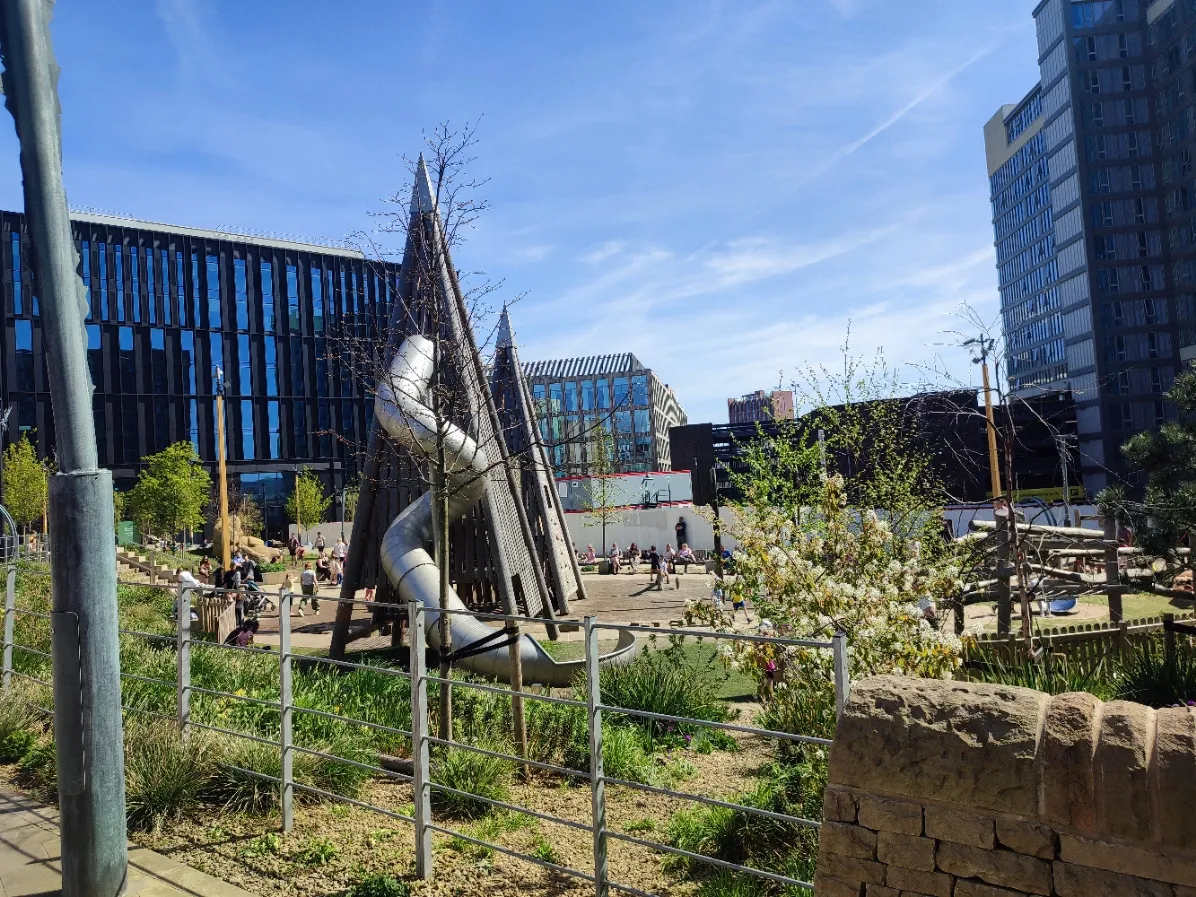Roast chicken. A bowl of popcorn. Our housing investigation. Three things that if not done properly aren’t worth consuming at all. Reader, please excuse the fact that our Thursday newsletter is dropping into your inbox on a Friday. But when Victoria’s investigation turned out to be more complex than we’d first imagined, we had to rejig a few things. So, forget about housing for now (we’ll bring that to you in due time, once the skin of the essay has turned golden and crispy). Instead, we have something just as sumptuous for you: we sent critic Mina Miller to the pre-opening of Cambridge Street Collective. It’s Europe’s largest food hall: but can quality match quantity? Mina reports on this below, after the jump.
The Tribune election survey
As everyone gears up for six weeks of intense campaigning, we thought it would be interesting to take the temperature of Tribune readers. We’ve put together a quick anonymous survey, where you can tell us who you’re minded to vote for, what issues matter most to you, and what you think the result will be. We’ll publish the results next week. Find it here.
Your Tribune briefing
📱 A shocking report from Now Then reveals that the University of Sheffield is using an app to track students’ locations, in order to monitor whether they actually attend classes. Data from the iSheffield app will be used to prove to the Home Office that international students are actively studying, in order to ensure that the university keeps its licence to sponsor visas. However, staff and students fear that technical glitches or human error could put students at risk of wrongful deportation.
👨⚖️ The battle of Leadmill versus landlord will continue for at least a little while longer, after a judge agreed to transfer the case to the High Court. The Leadmill Ltd, who have run the venue since the 1990s, are hoping to overturn the eviction notice they were served by their landlord, the Electric Group, in 2022. According to The Leadmill Ltd, the adjournment means they have “won [their] first battle and taken one step closer” to an eventual decisive victory.
💰 Private investors from Silicon Valley are contemplating buying Sheffield United, reports the Telegraph. The same investors were reportedly also interested last year but failed to strike a deal with the current owner, Prince Abdullah. At the time, the sale was reportedly worth around £115 million — they’re possibly hoping that the club’s recent relegation from the Premier League will have knocked a couple million off that price tag.
Things to do
🕺 Tonight, the sober and sober-curious can enjoy an alcohol-free clubnight at Plot 22, organised by RiteTrax. The event is primarily aimed at people in recovery but open to anyone and will feature live performances and DJ sets from people that RiteTrax has supported. Both entry and refreshments are free — find out more here.
🌍 On Saturday afternoon, Utopia Theatre is inviting the public into their Creative Hub for Africa Day, an annual celebration of African unity. From noon until 6pm, there will be music, dance, poetry, games and food. The day is free to attend but you should book your spot on their website here.
🎻 The grand finale of this year’s Sheffield Chamber Music Festival will take place at the Crucible on Saturday night. Audiences will hear Nonet by George Onslow — nicknamed “the French Beethoven” — as well as Fauré’s Élégie and Tchaikovsky’s Souvenir de Florence. Full-price tickets are £21 but you can attend for just a fiver if you’re a student or under 35. Grab yours here.
By Mina Miller
Stepping into Cambridge Street Collective (CSC) for a press tour at 11am, soaking wet from an unexpected downpour, I suddenly have a familiar jolt of recollection.
I can barely recognise the former premises of the spacious arts space and community venue Dina, one of the first places I spent time in Sheffield years prior to moving here. The site housed studios, where a friend of mine sewed costumes for local theatre productions; a vegetarian cafe where another friend served up kimchi toasties, and dilapidated but well-loved performance spaces used for local club nights and theatre rehearsals.
In Dina’s place, I am now standing in a slick food hall spanning three storeys, with industrial-chic beams and girders, external glass walls, an AR darts room, matcha soft serve counter and dedicated Japanese whiskey bar. The air smells like sawdust and fresh varnish and food traders and workmen are rushing around the space with purpose, holding tools, empty gastros and clipboards, readying the space for the VIP opening that evening. A small group of women, all blonde and wearing black, are huddled in a corner over their Macbooks, talking about social media.

Nothing stays the same forever, and that can certainly be said for Sheffield city centre’s regeneration, where the changes are so drastic it’s easy to lose your bearings. I’ve written about CSC before, in last year’s piece about Sheffield street food and dining halls. The newest venture by Matt and Nina Bigland, the married duo behind the ever-popular Cutlery Works in Neepsend, CSC is the largest “purpose-built food hall in Europe” (if you read between the lines, that’s marketing speak for the biggest venue built specifically for food, rather than the biggest food hall full stop). With a spate of recent high-profile restaurant closures and a difficult operating environment for brick-and-mortar businesses, CSC might just be the future of Sheffield’s dining scene.
CSC was supposed to open last autumn, but contracts and agreements with the council spelt out delays. When I intercept Matt, he tells me the venue was essentially built in 14 weeks. No small feat. The inspiration for CSC came from the ubiquitous hawker markets found across Southeast Asia, and Matt has stayed true to his promise to showcase a large amount of Asian food, which is a big part of Sheffield’s culinary identity. Indeed, the opening party later that day makes a point of showcasing CSC’s cultural diversity. The programme of events features origami demonstrations and steel drums; a ukelele band and Chinese lion dance; Bollywood and African dancers; as well as a slightly questionable Maiko performance.
As I do my first round of the venue, edging past a large band performing a cover of “Valerie”, I spot a stall called Homeland Delicacy, which serves up West African food. My interest is piqued by the fact they serve goat, which isn’t that easy to come by in the city centre.
“It’s good you’re here, so we can test it,” the woman behind the counter says, glaring at the POS system. Her name is Adora, and it seemed that in the rush to open, there are still some snags to work out. After a while and some deliberation, my items get rung up and I tap my card on the reader. “Outside payment area country?” Adora says. “What does that mean?”

CSC is Adora’s first time having a full-time food concession, having previously done private catering and street food. She and her colleagues smile and chat with me, as family members and their children pop in and out to say hello. I tried the moi moi dumpling, a concoction of boiled and peeled black-eyed peas that are pureed and steamed with a crayfish stock. Light rather than dense, the moi moi is silky and light, and the crayfish shells impart a mildly fishy aroma which complements the subtle flavour. The beef suya skewer is crunchy and chewy with a spiciness that steadily builds bite after bite. When I ask what the kitchen would recommend most on the menu, a chorus of female voices respond in unison: “Jollof rice!” The ultimate comfort food. Adora also recommends the egusi, a peppery stew of meats and spring greens you eat with pounded yam, and gives me a sample.
Eventually, Adora shoos me away, but I promise to come back and make good on the bill. “Thank you for being my guinea pig!” she says.
I continue ambling around the venue. I recognise Dev, the man behind Hungry Buddha’s dosa, from Moor Market, where he dishes up Nepalese curries and momos to a hungry lunchtime crowd. I ask about his choice to move into dosa – ‘It’s a South Indian food!” he exclaims. “Aren’t you Nepalese?” I answer, and his face breaks out into a bright smile. “Yes!” He responds. “But I lived for nine years in Bangalore!”
I’m not hungry enough for a dosa, but I examine Dev’s ones closely as they come shuttling out. The texture is paper-thin and crispy, just the way it should be. I ask Dev how he came to live in Sheffield. He tells me that in the 1970s, Nepal was a favourite destination for counter-cultural Europeans on the hippie trail. Apparently, his parents thought he might get swept up by the wrong crowd, so they sent him to college in India. When he got back to Kathmandu he became a professional trekker, helping travellers pick their way up Nepal’s steep and treacherous mountain trails. That’s how he met his now wife – who happens to be from here. “We were married in a church in Rotherham,” he says.

Dev never cooked in Nepal – that was the domain of his mother and sister and, he says, he was never allowed in the kitchen. When he moved to the UK in 2001, though, he missed the taste of home. “In Sheffield at the time, lunch was mainly sandwiches”, he says. But food, he believes, is a connector and builder of community. So he started cooking. He’s been at the Moor for eight years, and will keep his concession there, but he believes Cambridge Street is a step up. “It’s a very different crowd”, he says. When Dev tried cooking dosa at Moor Market, people missed the Nepalese food, so he had to change the menu back.
I ask Dev if he and his wife are still married, and he says yes. “In Nepal,” he said, “a marriage is for life”. A relationship, he explains, is two hands clapping. You put aside your ego and differences to work together. He and his wife have a 14-year-old daughter and Dev was taken aback when, on a recent trip to Nepal, she identified as British on a form she was filling out. He still thinks of himself as completely Nepalese, but Nepal has changed in his absence.

Comments
How to comment:
If you are already a member,
click here to sign in
and leave a comment.
If you aren't a member,
sign up here
to be able to leave a comment.
To add your photo, click here to create a profile on Gravatar.







